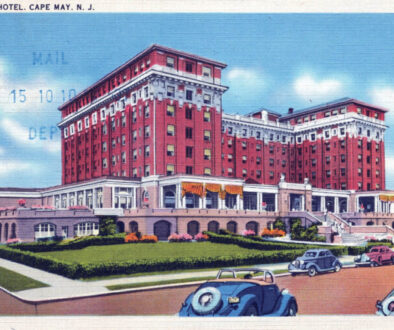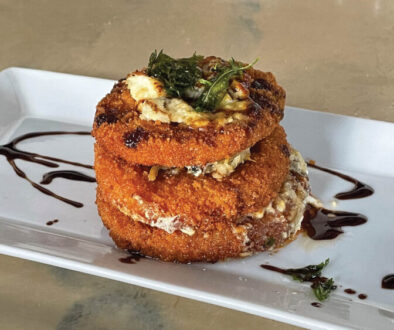The Next Generation of Cape May County Farmers


There is some dispute as to who first called New Jersey “The Garden State.” According to the State of New Jersey website, credit is alternately given to Abraham Browning of Camden in 1876, when he said that “our Garden State is an immense barrel, filled with good things to eat and open at both ends, with Pennsylvanians grabbing from one end and New Yorkers from the other,” and Benjamin Franklin, who has plenty of other accolades but also apparently recognized New Jersey’s location as a conduit between New York and Pennsylvania, and as such, our ability to feed both states.
Regardless of how the nickname originated, it stuck, gracing our license plates, and taking center stage in New Jersey’s “Jersey Fresh” marketing initiative—and with good reason. According to the New Jersey Department of Agriculture, “food and agriculture are New Jersey’s third largest industry—New Jersey is one of the top 10 producers of blueberries, cranberries, peaches, tomatoes, bell peppers, eggplant, cucumbers, apples, spinach, squash, and asparagus.” There are about 720,000 acres of productive farmland in New Jersey—not bad for a teeny tiny state.
And though the Cape May County region is often noted for sandy beaches, strollable boardwalks, and delightful downtowns—in short, tourism—there is a tremendous amount of farmland growing all the plants and vegetables that give our state its nickname. It’s tough work, and not a lifestyle people enter thoughtlessly, especially with so many obstacles to entry.
“The average age of New Jersey farmers is approaching 60, and we are in need of next-generation and new beginning farmers. Due to land and equipment prices, farming isn’t an easy occupation to break into, and it can be a daunting task to keep the family farm operation going,” says Jen Sawyer, Agriculture & Natural Resources Program Associate, Commercial Agriculture, Rutgers Cooperative Extension of Cape May County. “Here in Cape May County over the last few years, several small-scale farms have been popping up with younger first-time farmers leading the way, from growing produce and flowers to organic farming and mushroom cultivation.”
This new generation of farmers often uses a combination of new and old practices, from the regenerative planting methods of our ancestors to the very 21st-century skill of utilizing social media, particularly Instagram, to build at least a portion of their client base. It’s a whole new day for Garden State farmers, and we’re all reaping the benefits.
Bad Cat Farm

Shayla Woolfort has been a self-employed farmer since 2017, when she started Bad Cat Farm, which specializes in field-grown flowers as well as a selection of berries and herbs. And though she’s developed a reputation for cultivating beautiful flowers for weddings, events, and everyday bouquets, she still feels reluctant to call herself a farmer.
“I still don’t feel qualified to call myself a farmer,” says Woolfort. “I don’t own a tractor. I’m out here with a shovel. I try to do a lot of no-till planting. I’ll cover my fields with weed mat or mulch so in the spring it’s ready to plant. I’m very low tech over here at Bad Cat Farm.”
Despite her successful farm, Woolfort didn’t plan to become a farmer. In fact, growing up, farming was the last thing on her mind.
“My mom always had a big garden. She did farmers markets for a few years when I was a kid,” says Woolfort. “I hated working in my mom’s garden. I was like, I’m not cut out for this kind of life.”
It wasn’t until she spent several years in Philadelphia studying journalism and working as a barista—with just a windowsill garden as her connection to the land— that Woolfort began to miss the space and terrain she was accustomed to while growing up in Hawley, Pennsylvania, a big dairy farming area. When she and her husband Rob made the move to Cape May County, Woolfort began working at Beach Plum Farm. It wasn’t long before she was moving out on her own, with her focus on flowers.

“There are so many vegetable farmers around, but there aren’t a lot of flower farmers in this area,” says Woolfort. “Flowers are considered an affordable luxury.”
For the first few years, Woolfort rented out farmland from other landowners, selling her goods at farmers markets in West Cape May and Wildwood. Now in her third season of owning her own land—she lives and works on a five-acre property in Goshen—Woolfort has both name recognition and a farm of her very own.
“Land access is the biggest hurdle for anyone who wants to get into it who isn’t born into it and inherits thousands of acres of fields,” says Woolfort. “When we decided to start our own farm, Rob was fully supporting me doing so. His business was doing well enough for me to fail a little bit. So, I could quit my job and try my own thing, which was super privileged and lucky. I had no backup plan. I didn’t have an income, so it had to work.”
There are so many vegetable farmers around, but there aren’t a lot of flower farmers in this area. Flowers are considered an affordable luxury
Shayla Woolfort
It’s worked via a combination of hard work, focus, natural farming practices, and lots of customers, as well as creativity—Woolfort hosts wreath-making classes in the wintertime. Unlike local farms of the past, where an entire commercial crop might be purchased in one fell swoop by nationwide companies—either for food or ingredients—small farms often make it work by making a bunch of little sales. And how they do that often comes down to a uniquely modern marketing technique—social media.
“I don’t know what I’d do without social media. Go hang posters? I get my brides on Instagram. That’s where they see me. They see pictures that I post or that another bride posts,” says Woolfort. “I can’t rely on any one person to buy my crop like commercial farmers. I need a bunch of little sales.”
As for her thoughts about New Jersey as “The Garden State,” Woolfort thinks we need to hold fast to the slogan, and work hard to make it true. “Even if we don’t have acres and acres of rolling farmland of blueberries or tomatoes or corn, backyard gardens are still part of the garden state.”
Wood Song Mushrooms, LLC

Linda “Lin” Conover, owner of Wood Song Mushrooms, LLC, developed an interest in mushrooms by way of healthy soil.
“I was a master gardener volunteer and I got really interested in soil health,” says Conover, who is of no relation to the Clinton Conover Farms in Cape May Court House. “Fungus is one of the microorganisms that is a component of healthy soil. So, fungus became part of that discovery process. They are separate from animals or plants, and very critical in soil health and carbon sequencing.”
Though she wasn’t any more familiar than the average person about mushrooms—other than they taste good on pizza and cheesesteaks—Conover’s interest in fungi continued to grow, and in 2018, she started growing mushrooms as a hobby. Things grew from there. Like other local farmers, Conover wasn’t afraid of learning new things, and resorted to social media to connect with other growers.



A few of the mushrooms that the farm grows. Photographs courtesty of Woodsong Mushrooms.
“I really took to mushroom growing. It’s different. It’s unique. And it’s incredibly amazing. I spent a lot of time in Facebook groups. There are some really good ones for mushroom growing and people are happy to help. I learned a lot there,” says Conover. “You don’t need a green thumb—I can kill a plant like the next person, but I just took to it. It was a crazy idea that I could actually do it, but I felt there was a space for it, so I just started growing.”
There are many different ways to grow mushrooms, from using pressure cookers to utilizing sawdust material, as Conover does. And unlike traditional farming, mushroom farming doesn’t require a tremendous amount of space. Conover’s space is approximately 15 by 20, and only part of that is the grow room.
“The grow room is a controlled environment,” says Conover. “It needs its own space where you can really minimize contamination. You keep it really clean, you control the humidity, the temperature, the light, and those things that create a good positive environment for the mushrooms to grow.”
For Conover, that space is her garage, which was converted to a grow room with plenty of shelving for the mushrooms to grow in five-pound blocks of sawdust material. In this relatively small space, Conover produces multiple varieties of mushroom including King Trumpets, Lion’s Mane and Chestnuts, Enokis, and Pioppinos at different times of the year.
I really took to mushroom growing. It’s different. It’s unique. And it’s incredibly amazing.
Lin Conover
While Conover sticks with growing tried and true mushroom varieties—there are thousands—like Woolfort, her marketing efforts are innovative and contemporary.
“I started offering no-contact porch deliveries during the pandemic,” says Conover. “Instagram has been my go-to for deliveries. I just started a Facebook page, and I don’t have a website. Instagram is easy for people to share with their friends. I still do home deliveries and I enjoy that. It takes a little bit of time, but I really enjoy talking with people. There are a lot of mushroom fans.”
There’s also room to grow, as evidenced by the enormous mushroom farms in places like China and even Kennett Square. “I’m just starting to get into commercial production. I might grow between 30 and 50 pounds a week, but I could easily double that,” says Conover. “I feel like in general, people are looking to experience things in a different way. I think that the character that comes with (a small farm), it’s not industrial—it’s personal. I think we’re moving back towards that.”
Enfin Farms

For Elizabeth Degener, the route to becoming a professional farmer was based on family, and bread.
“The farm has been in our family since the early 1940’s,” says Degener of Enfin Farms. “My great- grandparents bought it after the Second World War. My great grandfather was a gentleman farmer—he grew for himself, nothing commercial or anything. But then my parents moved here in 1985, and I was born here. We always did stuff growing up, but it was nothing commercial.”
Though farming wasn’t a full-time occupation for Degener’s parents or grandparents, it was always particularly meaningful. The farm was named for the word “Enfin,” which means “at last” in French.
“My great grandmother was Belgian and was moving a lot during the Second World War with my grandfather, who was a naval commander,” says Degener. “After the war they bought the home and named it Enfin because she had found her forever home.”
Degener studied international business, but while she was in college in Ireland, she participated in the WWOOF (Worldwide Opportunities on Organic Farms) program, where she worked on European farms during summer holidays. She returned to Cape May County in 2010 with the intention of giving farming, and bread baking, a go.
“I learned some basics at some of the farms,” says Degener. “I just came home and started doing stuff, and even all these years later, you’re still learning. There’s so much to learn.”
While Degener spearheads the bread baking side of the business as Cape May’s “Bread Lady” and provides labor for the farm, her husband Joshua Andrewson occupies the planning role.
“My husband is really running the show here,” says Degener. “Josh and my dad do most of the farming. Organizing a farm is really different from being the labor or taking direction from somebody organizing the space. It’s almost like an art. Josh has a good vision for the space and he’s able to make the most out of every inch of the space. I don’t enjoy that. I just like working, pulling weeds and moving things and harvesting.”



Husband and baby watching mama work. The bread menu. Elizabeth taking bread to a customer.
Photographs by Kate Chadwick.
Enfin Farms places a lot of emphasis on no-till gardens, organic growing, pulling weeds, and a lot of bull labor, producing plenty of the seasonal fruits and vegetables that New Jersey is known for, including—but not limited to—cucumbers, tomatoes, asparagus, raspberries, strawberries and even flowers. Through it all, they keep things as natural as possible.
“It’s probably much the same as when my great-grandparents were here,” says Degener. “There are lots of great primitive tools and resources for farmers on the internet these days. They’ve made the job so much easier, and they’re just hand tools, no gas or anything.”
In addition to the produce that Enfin Farms grows, as the Bread Lady, Degener is known countywide for her breads. Using a wood-fired clay oven in a commercial kitchen on the property, Degener bakes 15 to 18 different flavors including rosemary thyme, curry fennel coconut milk, sage polenta, smoked garlic and more.
While Enfin Farms has sold their produce and bread at a farm stand on their property in the past, things are always evolving, which is why Degener and Andrewson, like other next generation farmers, rely on social media. Using Instagram and Facebook, Enfin Farms keeps customers up to date about hours, pop-up events, and the availability of their products.
“We’ve had to adapt so much, every year is changing,” says Degener.
Hawk Haven Vineyard

Todd Wuerker is the third generation working his family farm, although he’s gone in a direction the previous generations may not have expected: Wuerker is responsible for transforming a commercial farm to Hawk Haven, a popular vineyard and winery.
“Todd’s grandfather ran the farm in the 1940s when he came over from Germany by way of Wisconsin,” says Kenna Wuerker of her husband’s family. “He started with dairy cows, and I think that was pretty short-lived, and then over to vegetables. So, string beans, soybeans, that kind of thing.”
At one point, Wuerker’s grandfather and then father farmed hundreds of acres of land. While Todd’s father continues to farm about 20 acres of crops today, Todd has taken the family farm in a whole new direction.
“Todd’s dad was like, ‘farm what you want.’ Todd and his brother planted the first vines in 1999,” says Kenna. “It’s a very different style of farming. Then there’s also a lot that goes along with it. You’re not selling the grapes and then walking away. You have to have the tasting room and the production and actually make wine. So, it’s a lot more involved than traditional farming.”
When Todd planted those first vines, he was taking a risk. New Jersey wasn’t yet the wine hub that it’s become—the industry was still pretty new. And though Todd’s original plan was to create a Napa Valley-like experience, with wine tastings and vineyard tours, Hawk Haven has managed to be a uniquely South Jersey destination, providing both a more refined wine-drinkers experience, as well as a live music destination for the community.
“I don’t know how much I love the term agritourism,” says Kenna, “but it’s grown so much in the past 15 years. Years ago, probably about the time when we were getting started, the winery industry was growing. There seemed to be more vineyards planted and more people starting wineries with this idea of kind of operating like a bar or restaurant, where you’re having live music and concerts and events and these kinds of things. That started picking up when we started the winery. So, we’re kind of in this format of agritourism.”
The result has been a farm that’s dramatically different from its previous incarnations. Hawk Haven maintains about 20 acres and grows almost 20 different varietals of Vinifera grapes (European wine grapes). While Todd’s main focus is on farming, he’s also the executive winemaker at Hawk Haven. He has help in the form of a head winemaker and an assistant on the wine side, with a limited number of additional staff for farming and grounds maintenance. And when things get particularly labor-intensive, the Wuerkers bring in a harvesting service called VineTech to help.
“The kind of farming they did was never something that was so part of the community from a PR perspective,” says Kenna of her in-laws. “They certainly weren’t inviting people onto the property. It’s nice for them because they never really got to do that when they farmed.”
With so many large-scale farms being sold as either subdivisions or farmland preserves, Kenna is happy that Hawk Haven produces something for people to enjoy.
“The larger scale farming isn’t there as much anymore,” says Kenna. “For us, we’re farming a product you will consume. I love that about our local farming.” ■



